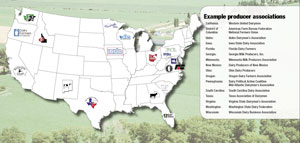The Great Dairy Shock of 2008-2009 (and still trembling) created a tremendous effort at evaluating the current dairy policies and designing ones that would eliminate another such shock, or at least limit its impact. The focus is on national policy. Congress has held hearings on the issue. The USDA has created a dairy industry advisory committee. The Department of Justice has held field hearings on the issues of antitrust and dairy. National trade groups have together, and separately, considered various approaches to the policies. State, regional, breed and other groups are actively developing their own ideas. Those efforts, as well as discussions in this magazine, focus on the national, sometimes international, issues of marketing orders, pricing mechanisms, price support, supply management, milk protein concentrates and more.
On top of those are the national issues of immigration, international trade agreements, environmental regulation, climate change legislation, renewable energy grants and more.
To say the least, there is a great deal of diversity of opinion among producers on these issues. Some are for this, some for that and some against. Nonetheless, they all have one opinion in common – they are national issues and require national legislation or regulation to resolve. The issues directly affect dairy producers, but there is still only talk, and resolutions are one to two years away, if not later.
Meanwhile, back in our backyards, our state legislatures are actively addressing issues with new laws, regulations and constitutional amendments that directly impact dairy farmers every bit as much or more than some of the national proposals. Some of these are already law; others could be soon.
Some are good. Last year Ohio voters approved the creation of a board to establish standards for animal husbandry in order to restrict activists from using the courts to regulate animal care, and the New Mexico legislature passed a bill providing dairy producers funding to move manure from the farm to a central processing facility.
Some have hurt dairy farmers. Florida voters several years ago passed a constitutional amendment that effectively banned modern hog farming in that state. California’s voters passed legislation of a similar kind for poultry. Arizona and Colorado’s legislatures have passed stringent additional requirements for employers in screening of undocumented alien workers, ones now being challenged all the way to the Supreme Court.
The U.S. is still a federalist system with dual sovereignty between the states and the federal government. Many issues affecting dairy farmers are decided at the state and local level – taxation, environmental regulation, zoning and land use regulations, employment taxes and regulations, weight limits on milk trucks and more.
These local fights become high stakes. The hot issue in California is changing the rules of overtime pay for agricultural workers. A bill, SB 1121, has passed the assembly but was vetoed by the state’s governor. The bill would have shortened the agriculture work day from 10 to 8 hours and the work week to 40 from 60. The California Farm Bureau Federation noted that only three other states have overtime for agricultural workers, and none with the low thresholds in the defeated bill. Dairymen can quickly determine what the impact would be on their own labor costs if such a law went into effect. It would be worse than a national law on union voting or many of the other dairy policies being discussed today.
Another labor issue that could hurt California dairies is “card check.” Three times California’s Governor Schwarzenegger has vetoed “card check” legislation passed by the legislature. Although it has not passed similar legislation this session, there is nothing to say it could not do so before the year is out.
Card check or, as its supporters call it, the Employee Free Choice Act or EFCA, would significantly change how employees choose to be in unions or not. EFCA would result in union recognition if more than one-half of the workers sign cards that they support the union. Union representatives, without management or even other employees, can hand employees these cards and ask the employee to check the “yes” box and sign the card (thus the term “card check”). These cards are ballots. Once a majority of employees check yes, the union has been voted in. This open, public, card check ballot would replace the current system, where employees get to vote by secret ballot whether they want a union or not. Under the terms of the proposal, once a majority of employees have signed a card, union membership becomes mandatory for all employees. Further, employees do not get to ratify the first contract between the union and management.
Pro-union forces claim that the EFCA is needed to level the playing field with management. Current laws and regulations, they say, hinder employees rightfully wanting to organize their work place and obtain recognition from management. The biggest obstacle, according to them, is the secret ballot union election. They claim that it takes too long to have an election and that management wins most of the elections. Statistics from the National Labor Relations Board (NLRB) show that the average election is held within 39 days of filing a petition and that all but a handful of elections are held in less than two months. Of the recent elections held, unions have won more than 60 percent of them.
When the issue of union representation comes up, it is a fight between the union and management. Employees, the ultimate judge of whether or not to unionize, are caught in between. As the ones who decide, doing so in the privacy of the voting booth protects them from the pressures from both sides and permits the employee to clearly vote her or his conscience.
I am aware of only a handful of dairy farms throughout the country who have union workers. One, in Ohio, is no longer operating and its land and buildings are being sold. In both of those cases, there were publicly reported incidents of abusive management that raised the ire of employees, enough to provide an opening for the union.
The best defense against a union is to treat employees fairly and respectfully. Employers who do that, dairy and non-dairy, have been successful in stopping unionization of their operations. As more and more employers get that message, union membership has dropped to 7.2 percent of the work force, and it is shrinking. In agriculture in 2009, only 1.1 percent of workers in agriculture and related industries were members of unions.
By instituting card check, employers would not be able to tell their story to their employees before an election. Rather, one by one, employees would be approached, generally alone, by union supporters for the worker to fill out the card while they watched. It is not just about ending the secret ballot, it is about ending the kind of full discussion and consideration that should come before such a momentous decision.
Meanwhile, back in Washington, card check is stalled. It has passed the House but requires 60 votes in the Senate and there are not 60 votes. All agree that if it does not pass this year, it is dead. Republicans are expected to gain Senate seats and all those potential new senators oppose card check. Despite the stalemate, the proponents urge consideration after mid-term elections, with hope for passage in a lame duck session.
While Congress wrangles, state legislatures are acting. The California card check and agriculture overtime bills are just two examples legislation considered and passed each year by state legislatures that directly affect dairy farmers. These are the laws that have passed. But for every law that is passed, there are dozens that are put in the hopper that are never passed, and hundreds that are proposed that are never offered. Many proposals which would harm dairymen are stopped before they get very far. How is this done?
Working on behalf of dairymen are state dairy producer trade associations. ( Click image at left to view at full size in a new window. )
According to the California Senate analysis of the overtime bill, the Alliance of Western Milk Producers and Western United Dairymen were actively opposing the measure. These and similar state producer organizations throughout the country establish working relationships over time with members of the legislature, state administration and their agencies. Through these contacts and relationships they are able to fight on behalf of their members when legislation comes up that would harm their members. Working with organizations with similar agendas, or sometimes alone, they present to those who would change our laws the impact those changes would have on a vital industry. Most dairy states, though not all of them, have such organizations. If your state does not have such a group, you should form one.
Most of the time quietly, without fanfare, and often without credit, these organizations protect their members from the injuries of government that is either ignorant of the effects of laws, does not care or actually does want to harm the agriculture industry. When they need to, they go public. California groups and the Farm Bureau are urging their members to ask the governor to veto the bill. They do not win them all, but they win plenty, and even when they lose, they have often been able to soften the impact.
These state and local laws and taxes, often small by themselves, add up one by one until in total they greatly shock the dairyman, often to the point of no longer being able to operate. Despite the headlines, the local and little still count, and count big. PD

-
Ben Yale
- Attorney
- Yale Law Offices
- Email Ben Yale







